Wall-mounted air conditioners (ACs) are one of the best single-room cooling solutions.
These are usually attached to the wall, under the ceiling, keeping them out of the way. Most owners prefer professional installation, as you need to be handy to DIY it.
This article gives you a lot of information about the choice factors and unit functionality, ultimately helping you to select the best wall-mounted AC for your needs.
At a Glance: Our Top Picks for Wall Mounted Air Conditioners
- OUR TOP PICK: DAIKIN MIni-Split A/C 12,000 BTU
- RUNNER-UP: Alpic Mini Split 18000 BTU
- BEST BUDGET OPTION: Cooper & Hunter 12,000 BTU
Comparison of the Best Wall Mounted Air Conditioners
| IMAGE | PRODUCT | |
|---|---|---|
Our Top Pick  |
| View Latest Price → |
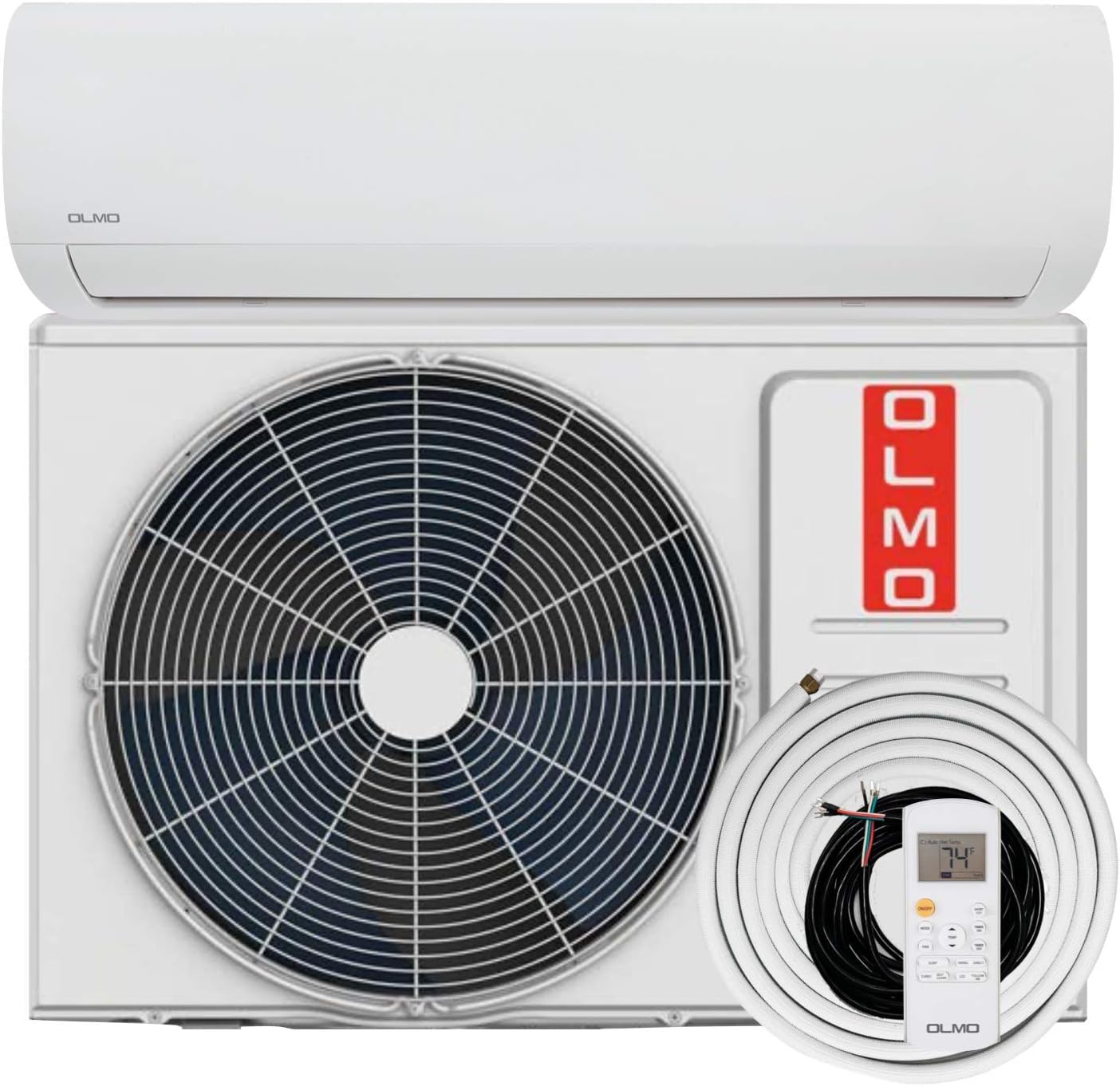 |
| View Latest Price → |
Best Budget Option  |
| View Latest Price → |
 |
| View Latest Price → |
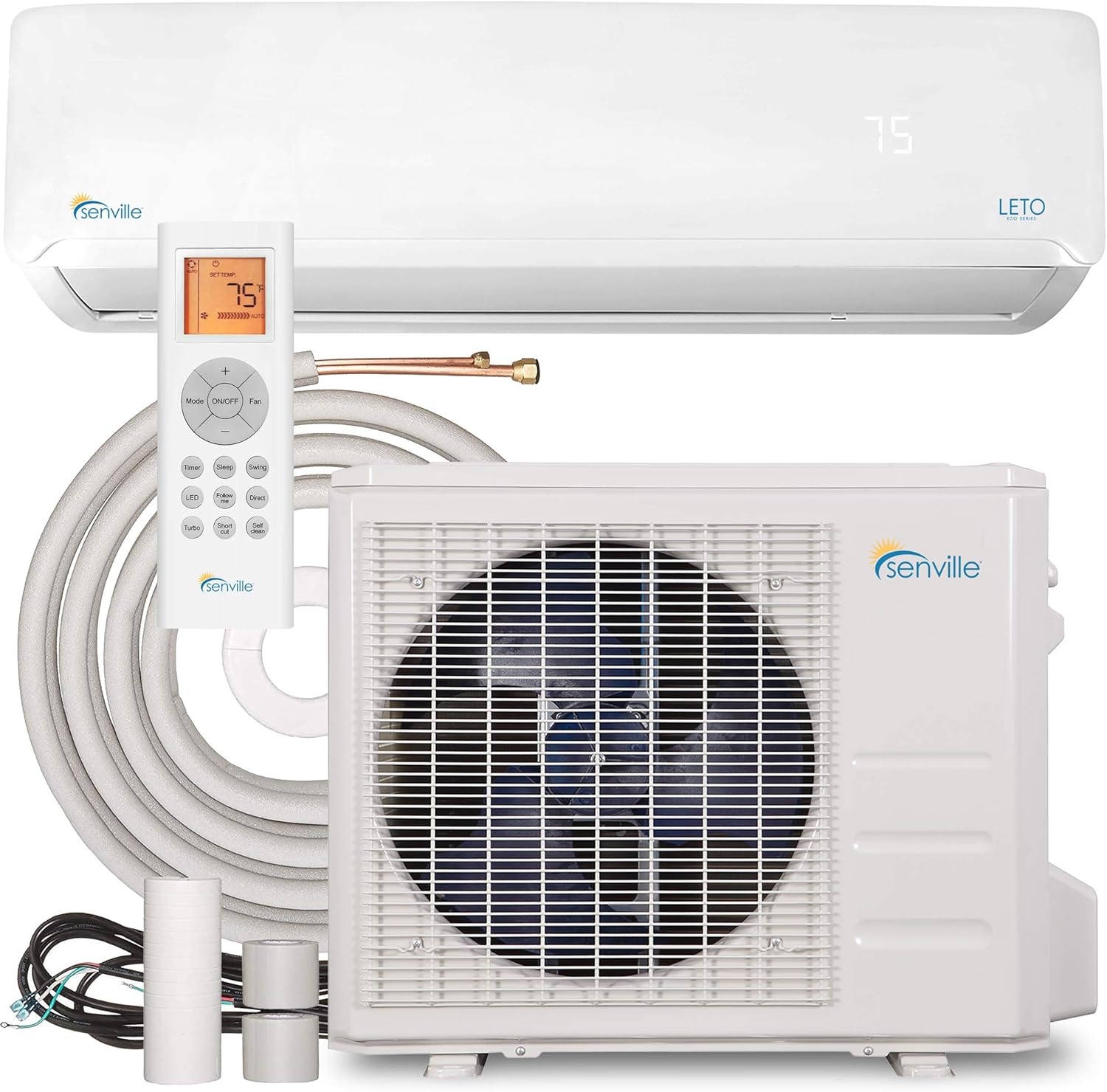 |
| View Latest Price → |
 |
| View Latest Price → |
 |
| View Latest Price → |
Factors to Consider Before Buying Wall-Mounted Air Conditioners
If you’re considering a wall-mounted AC for your home, there are some factors to look out for. Thinking about them will help you maximize the comfort this purchase can add to your life.
Room Size and Cooling Performance
Choosing the proper AC for your area is straightforward. Measure the length and the width of your room to get the square footage. Simple conversion charts will tell you the British Thermal Units (BTUs) you need.
How to Choose the Right Size Wall Mounted AC Unit
This is a rough estimate. It doesn’t account for other factors like airflows, ducting age, insulation quality, and maximum occupancy.
The efficiency also depends on the room you’re going to install the unit. Kitchens, for example, can get hotter than other spaces. For the optimal choice, you should add BTUs to the standard square footage option.
You can also use a BTU calculator for the best approximation or ask a specialist to calculate it for you.
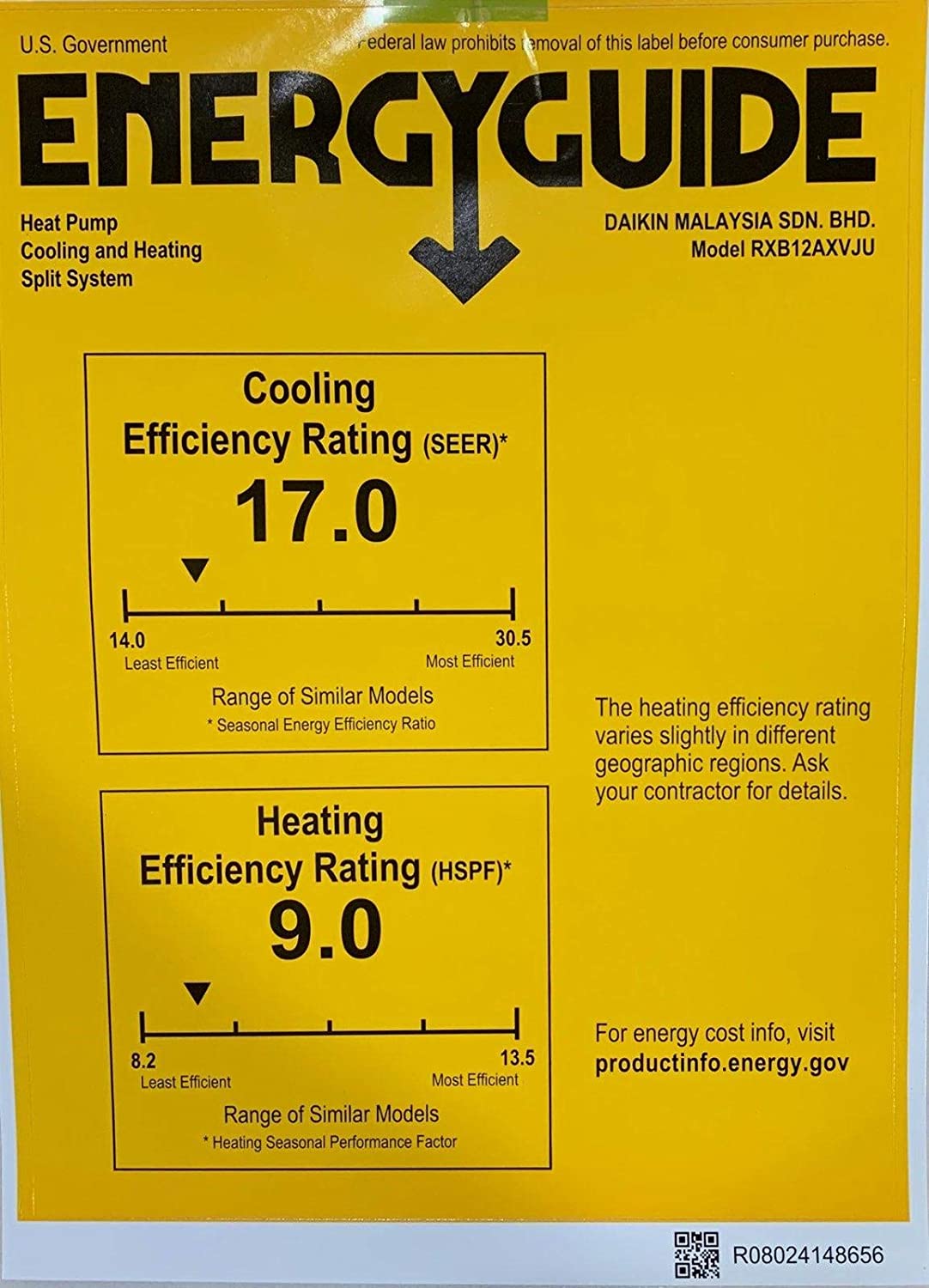
Efficiency Ratings
Depending on how well different units cool the same area in the ideal conditions, they’re granted a specific rating. It’s the ratio of how much energy the system consumes to the coolness it produces.
In addition to the general energy efficiency ratio (EER), experts also use seasonal energy efficiency (SEER). The latter is the typical energy consumption of a unit during the cooling season, calculated in watt-hours.
Operation Modes
The modes are all the functions of your unit. It’s an industry standard to have heating and cooling in an AC these days. Top appliance brands also offer systems that have dehumidification and fan-only settings.
Secondly, the modes are pre-set and convenient functions. You can use them at the touch of a button, knowing that your appliance will be working at an optimal level, with no manual tweaks needed.
One of the most widespread modes is the “Sleep” setting, where the unit adjusts to your schedule and works quietly in the background without freezing the room while you’re asleep.
Timer
The best ACs from top brands usually have some programmable functionality. You can set the unit to turn on and off at certain times during the day and week. Some innovative systems even pick up your patterns without the need for manual programming.
Timers provide extra convenience, which also saves money in the long run.
Digital Temperature Control
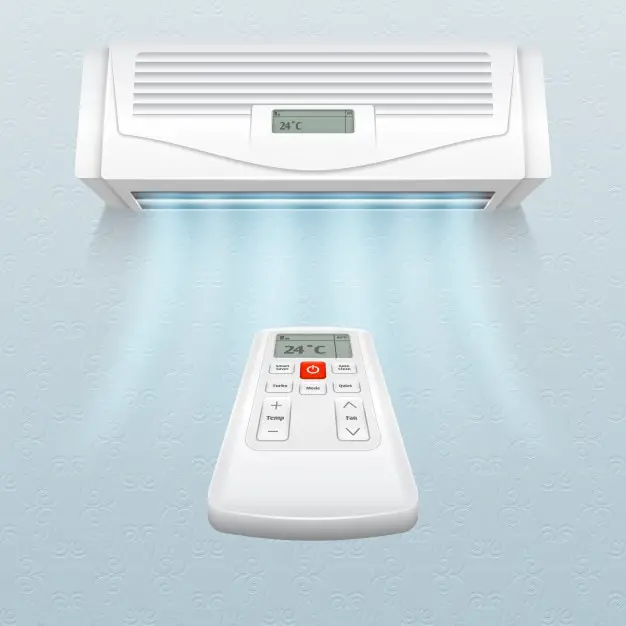
Digital temperature control is an AC benefit that has been around for decades. Units usually have an led panel that displays the set temperature and other information like the modes. In most cases, there’s another panel on the remote if the appliance has one.
Brands have taken temperature control to the next level in recent years. They applied the sensors on the remote instead of the unit itself, making the AC more “aware” of the temperature around you.
Accessible, Easy Clean Filters
AC maintenance isn’t one of the most pleasant events. Still, you have to clean and/or change filters from time to time.
Looking for easily detachable filters on your AC is essential to make your life easier during the unit’s lifetime. Most ACs come with cleanable ones that only require dusting or vacuuming from time to time.
You can look for the filter lifetime information in the user’s manual to ensure you change it according to the manufacturer’s requirements.
Another nice-to-have feature is the so-called “Auto-clean,” where the unit changes the mode to remove dust and harmful particles from the filter between regular cleaning sessions.
Review of the Best Wall Mounted Air Conditioners
The section below reviews several top brands and AC models, providing specs, advantages, and disadvantages.
Best Overall
DAIKIN Mini-Split A/C 12000 BTU
Specifications
BTU (DOE): 12,000
Coverage Area: 550 sq.ft.
Airflow (CFM): N/A
Dimensions (in): 10.75x26x21.8″
Weight: 68 lbs.
We may earn commission from purchases made from our links, at no additional cost to you
Specs
Voltage: 230 V
SEER: 17
Review
This split system is a top performer in terms of energy efficiency and low noise levels. With the wide variety of modes and comfortable controls, the unit adapts seamlessly into your home, making it a better place to live.
Due to the smart inverter technology and variable-speed compressor, this system ensures the efficient heating and cooling of the whole room without temperature fluctuations. The specific louver design helps eliminate blind spots, pushing the cool air to all the corners of your space.
Bottom Line
Daikin Mini-Split A/C is a recommended choice for areas around 550 square feet. With the SEER of 17, this unit is the best overall among the choices on our list.It provides quiet and thorough climate control over the whole area due to the intelligent louver design. Once the unit is professionally installed, you can account for the 10 year warranty and enjoy the newfound comfort of your space.
Pros
Ten-year warranty
Wide-angle louver design
High energy efficiency rating
Low speeds with minimal noise (as low as 37 dB)
Indoor, outdoor units, wall mounting bracket, and the installation kit included
Cons
Professional installation needed
Runner-up
Alpic Mini Split 18000 BTU

Specifications
BTU (DOE): 18,000
Coverage Area: 700-1,000 sq ft
Airflow (CFM): N/A
Dimensions (in): 40x 40x 40″
Weight: 290 lbs.
We may earn commission from purchases made from our links, at no additional cost to you
Specs
Voltage: 230 V
SEER: 16.8
Review
With features like Auto restart, turbo, and sleep modes, this AC covers all the basics of a respectable model. It also offers low ambient cooling and temperature compensation. It promises 25 to 50% less energy usage than electric zonal heaters.Another highlight of this appliance is its ductless design, which means that the refrigerated air flows right into the room.
The box includes the indoor and outdoor units and the intelligent remote. Plus, the installation technicians would be happy to know that the manufacturer provides all the required installation components.
Bottom Line
Although this is a runner-up, Olmo’s Alic Mini-split checks all the essential heating and cooling boxes.With low noise levels and reasonable energy efficiency, the unit will serve your needs as it’s supposed to.
Pros
LED display and sleek design
Self-diagnosis during failures
Inverter Compressor by Toshiba
Intelligent defrost and pre-heating
Limited warranty of five years on the compressor and two years on parts
Cons
Missing components among the installation kit elements
Best for the Money
Cooper & Hunter 12000 BTU

Specifications
BTU (DOE): 12,000
Coverage Area: 450-550 sq.ft.
Airflow (CFM): N/A
Dimensions (in): 36x36x18″
Weight: 114 lbs.
We may earn commission from purchases made from our links, at no additional cost to you
Specs
Voltage: 230 V
SEER: 19
Review
This unit can be a year-round solution for your home or office due to the heating, cooling, and dehumidifier functionality.
The inverter technology ensures 60% less energy consumption, and the ductless design eliminates leaks and maintenance issues. You just need to wash the filter once or twice a month. In addition to this, the unit has a built-in “Auto-clean” mode to protect your space from mold and mildew.The timer and last setting memory functions help you talk to the unit in a language you both understand.
Bottom Line
Cooper & Hunter Ductless Mini-Split unit doesn’t offer a fan-only option, an industry-standard at this point. However, it’s packed with other intelligent and useful functions.With SEER higher than the units mentioned above, and a price lower than most on our list, we dub this one a winner in the “Budget” category.
Pros
Thirty-day hassle-free refunds
Separate dehumidifier functionality
Wi-Fi, timer, and last setting memory
Easy maintenance with a washable filter
Premium features like auto clean and auto reset
Cons
No fan-only mode
Best Wall Mounted Ductless Air Conditioner
Pioneer WYS009A-19
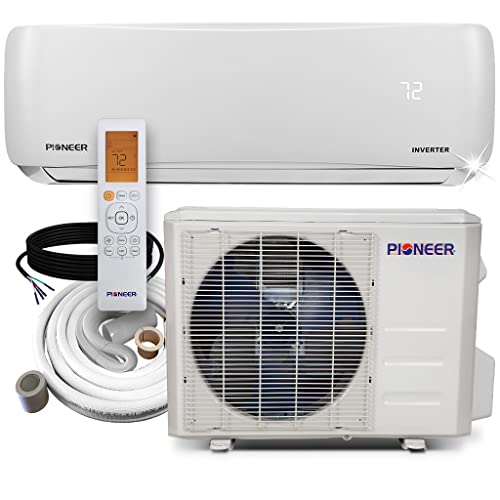
Specifications
BTU (DOE): 24,000
Coverage Area: 1,400-1,500 sq.ft.
Airflow (CFM): N/A
Dimensions (in): 8.8x 42.5x 13.2″
Weight: 17 lbs.
We may earn commission from purchases made from our links, at no additional cost to you
Specs
SEER: 17
Review
Pioneer is known to pay special attention to product design. This unit isn’t an exception. The indoor section is sleek, and the temperature controls are built into the front panel. It’s equipped with permanent washable filters and a multi-speed fan.
This unit comes with all the necessary components for a painless installation. However, to ensure that the setup is perfect, the manufacturer recommends hiring a professional technician to install the unit.In addition to the remote it comes with, an app can also connect to the AC and control it.
Bottom Line
Pioneer uses the mini-split technology in a design-oriented fashion, making the indoors unit an excellent addition to your interior design. The outdoor variable-speed inverter compressor is made from metal with epoxy paint. It stands out from the crowd due to its quiet operation and durability.This mini-split model is an excellent option for those who want to have the best split ductless unit installed in their space.
Pros
Optional accessories offered
Elegant design and bright LED section
Five-year warranty on parts and compressor
Indoor, outdoor units, plus the installation kit
Support hotline for the best customer experience
Cons
Minor manufacturing flaws like missing parts
Best Wall Mounted Air Conditioner Heater Combo
Senville SENL-09CD

Specifications
BTU (DOE): 9,000
Coverage Area: 100-450 sq.ft.
Airflow (CFM): N/A
Dimensions (in): 10.43x 26×21.26″
Weight: 25 lbs.
We may earn commission from purchases made from our links, at no additional cost to you
Specs
Voltage: 110/120 V
SEER: 19 (for cooling), 20 (for heating)
Review
The unit is a four-in-one solution for a whole-year use for spaces of up to 450 square feet. With its heating and cooling functionality, this Senville AC stands on top of the combo unit lists, ensuring comfort and enjoyment for all users.
The dehumidification function helps keep the area free from mold and mildew, while the fan ensures the flow of fresh air to the room. The maintenance is easy with removable filters.The highlight of this product is that it’s designed for the harshest climates. The outdoor unit works infallibly in extreme heat and cold. Although our review includes information about the 9,000 BTU units, you can find similar models of up to 30,000 BTU.
Bottom Line
With a whisper-quiet operation of 25dB, this AC covers all your needs during the whole year. It’s an excellent addition to your bedrooms and nurseries.Turbo mode, dehumidification, fan-only functionality, heating, and cooling make up for an outstanding unit that will serve you for years.
Pros
Turbo functionality
16 ft copper line set included
Works during winters of up to 5F
Technical support and a five-year warranty
Four-in-one unit with heating, cooling, dehumidification, and fan
Cons
Minor manufacturing errors reported
The installation manual doesn’t provide too much detail
Best Fujitsu Wall Mounted Air Conditioner
Fujitsu Halcyon 15RLS3Y
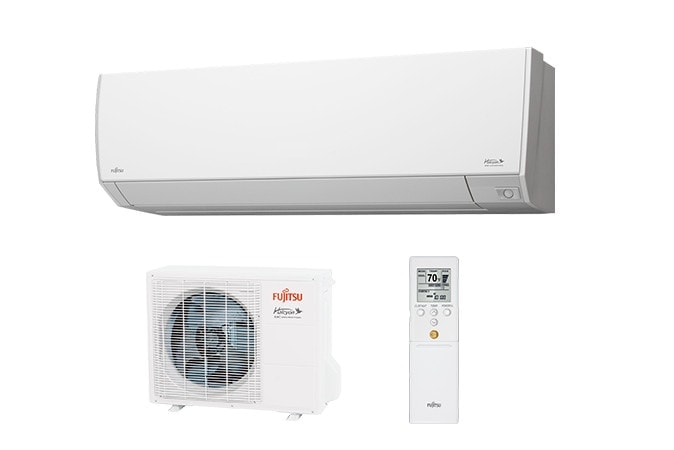
Specifications
BTU (DOE): 15,000
Coverage Area: 700 sq.ft.
Airflow (CFM): N/A
Dimensions (in): 11 7/16×31 1/8×24 1/2″
Weight: 122 lbs.
We may earn commission from purchases made from our links, at no additional cost to you
Specs
Voltage: 208/230 V
SEER: 25, up to 33
Review
The Fujitsu Halcyon line promises an intelligent conversation between you and your AC. These appliances learn your behavior around the house due to the daily and weekly timers. They’re also compatible with home automation.
You can program it to turn on and off at certain times and change to sleep mode when necessary. It has an economy mode, which saves you from large electricity bills.
Bottom Line
Fujitsu is a well-known brand in the AC market, and this product model is their best one so far. In addition to covering all the necessary modes and functionality, the aircon exceeds expectations in the smart-home area.
Pros
Energy-saving and quiet modes
Compatible with home automation
Low noise indoor and outdoor units
24 Hour, weekly, sleep, and program timer
High ceiling mode and remote temperature sensor
Cons
Expensive service costs reported
Best LG Wall-Mounted Air Conditioner
LG ARTCOOL 18,000 BTU

Specifications
BTU (DOE): 18,000
Coverage Area: 700-1,000 sq.ft.
Airflow (CFM): N/A
Dimensions (in): 8 11/32×39 9/32×13 19/32″
Weight: N/A
We may earn commission from purchases made from our links, at no additional cost to you
Specs
Voltage: 208/230 V
SEER: 21.5
Review
LG ARTCOOL is one of the leading AC lines in the brand’s catalog. The unit offers maximum airflow control due to the six-step louver positions and four-way swing.
One of the unit highlights is the three sleep mode functions: indirect airflow, a seven-hour off timer, and “soft wind.” This rest time logic makes the unit adapt to your sleep patterns and makes it one of the top units best for bedrooms.
The trademarked “Dual Inverter Compressor” technology helps cool the area faster using less energy due to the compressor’s wider rotational frequency. The unit also uses innovative technology, pairing with your mobile device via the LG ThinQ application.
Bottom Line
LG ARTCOOL 12,000 BTU is a top-of-the-line product from a world-known brand, pouring the research and development of decades into one appliance. It improves your home air quality due to the automatic cleaning function. A touch of a button cleans the filter from dust particles.
You can cool the room entirely with the help of “Jet cool” functionality and sleep better with the intelligent cooling modes.
Pros
“Dual Inverter Compressor” technology
Three functions for a comfortable sleep
“Jet cool” functionality for faster cooling
Four-way air swing and six louver positions
Automatic cleaning for better indoor air quality
Cons
No periodic faultiness reported
Top Brands for Wall-Mounted Air Conditioners
Many home appliance manufacturers have jumped into AC production over the recent years. Still, there are some pioneers with years of research and development under their belts. Here are a few of them that still hold their power over the industry.
LG
LG has been a long-time player in the AC space. Today, it offers various portable, window, through-the-wall, and mini-split units for consumers worldwide. Depending on what you want to achieve, the company can offer you one of the most diverse model varieties.
Another brand highlight is the LG ThinQ smart technology. This innovative approach makes your home a more friendly space.
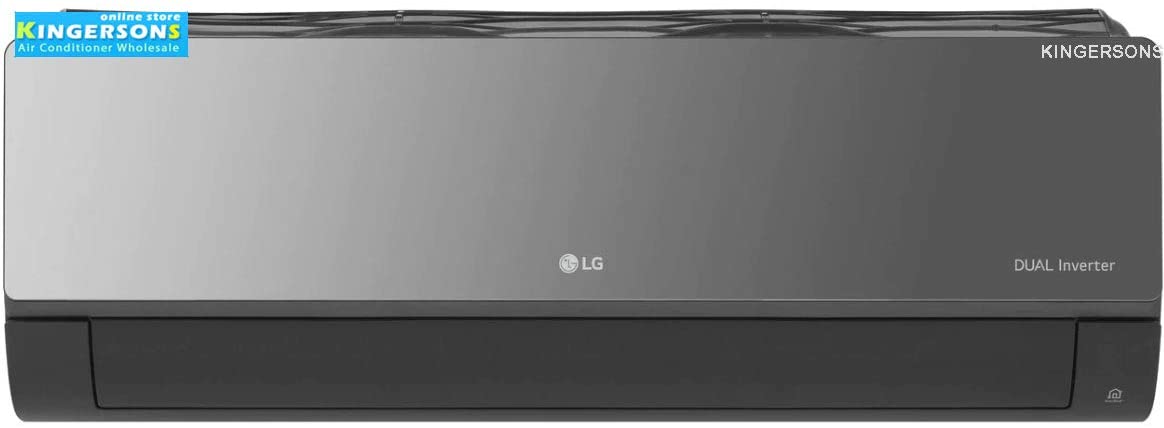
Haier
Haier is a quality Chinese brand specializing in home appliances, including ACs and mini-split units. The brand has developed a few separate series among the single-zone solutions to all target audiences.
- Tempo: The starter series for residential spaces
- Advanced Plus: Budget-friendly for cold climates, energy-efficient
- Arctic: Heating and cooling in harsh conditions in one sleek appliance
- Arctic Next Gen: Exceptional convenience year-round, with built-in Wi-Fi capability
- Flex Fit: Three types of units for small commercial, residential, and server spaces
Frigidaire
The company started producing refrigerators at the beginning of the 20th century. Today, this electronics manufacturer is a division of European Electrolux corporation. In the 1990s, the company was so well-known in the USA that people used to call all the refrigerators Frigidaire.
The AC division produces a variety of window-mounted, built-in, and portable units. It also offers large-scale HVAC solutions and packaged terminal air conditioners (PTACs).
Price Points of Wall-Mounted Air Conditioners
Wall-mounted units are the least expensive among the systems that need professional installation. Still, the technicians might request hundreds of dollars for the job. A few factors can also impact the cost. Among them are the unit capacity (in BTUs), the brand, and single or multi-zone setting.
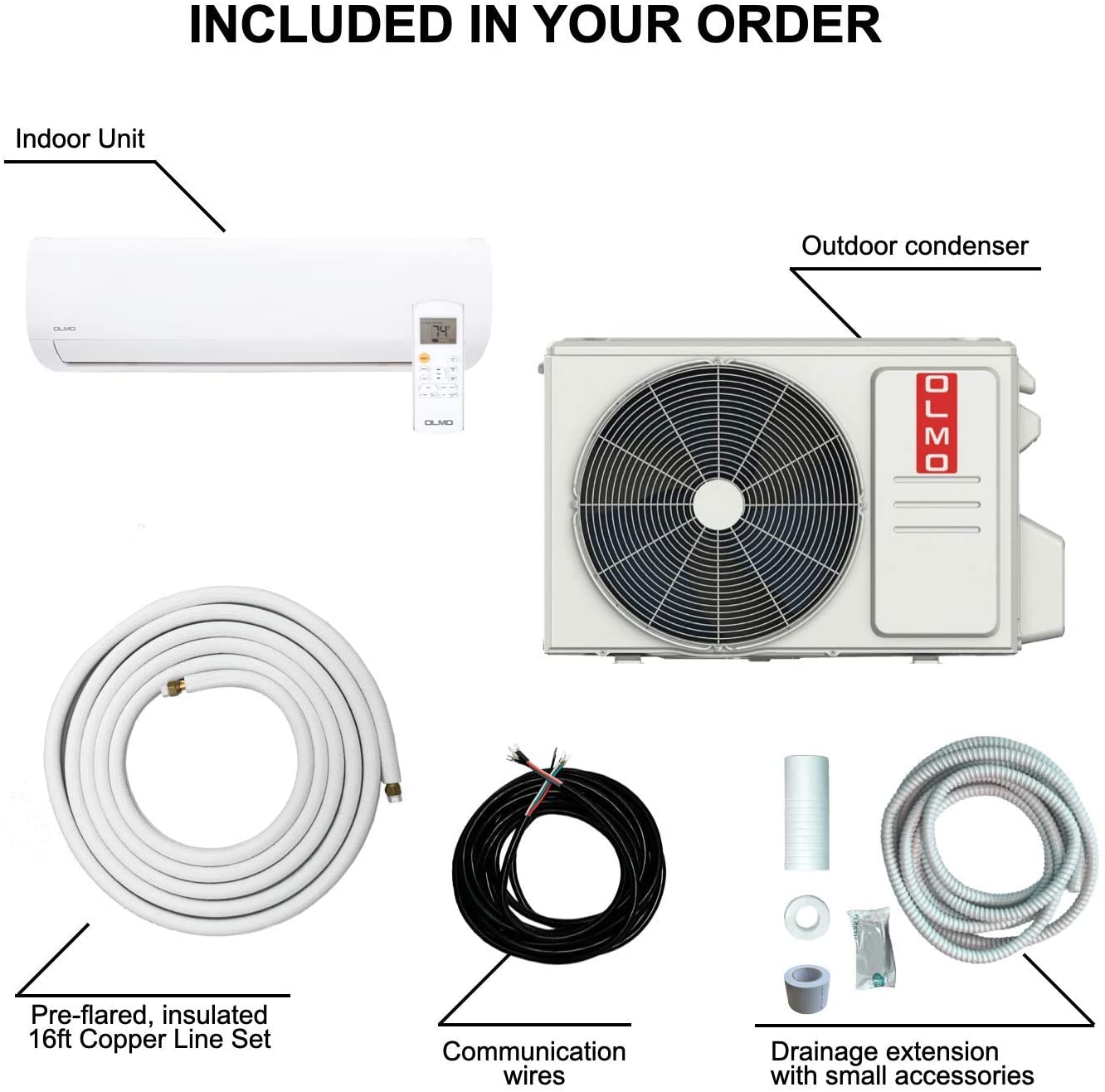
$700 – $3,000
This cost is the average for a mini-split kit which contains the indoor unit, the outdoor condenser, and the installation components. The latter sometimes includes copper lines, communication wires, and drainage tubes.
$400 – $1,000
This is the cost of each indoor section. Depending on how many of them you’re installing, the price might climb faster than you’d know it.
$200 – $2,000
The labor costs might fall anywhere in this range depending on your location, the unit type, and the number of indoor units.
$5,300 +
In the USA, this is the national average for an AC unit and installation.
$1,678/$9,548
The lowest and the highest price observed for mini-split units, installation included.
Benefits of a Wall-Mounted Air Conditioner
Wall-mounted ACs are a better alternative to the portable or window options for a few reasons. We’ve outlined some of the most substantial ones below.
Better Cooling
Similar BTUs in a wall AC seem to cool better than in the case of a window unit. There are a few technical reasons for this, but the main one is the quality of fans and condensers.
Larger Variety
Most leading brands have a wider variety among the wall-mounted units. This means that they’ve gotten more research and development over time, making their technologies more mature and advanced.

Design and Usability
Wall units are out of the way. They’re easier to make a part of the wall design, even if you install the appliance after the renovation. Unlike window ACs, they don’t block a window during the season. Compared to the portable ones, they look sleeker and don’t take up space.
Economical and Affordable in the Long Run
While the initial costs could be much higher for a wall AC because of the installation costs, they’re more economical in the long run. They don’t leave cracks and don’t need ugly sealing screens and foams to keep the hot air outside from seeping in.
Who Should Not Buy a Wall-Mounted Air Conditioner?
Contrary to all the benefits described above, the wall-mounted AC isn’t a “one size fits all” solution. Here are a few considerations you might want to keep in mind.
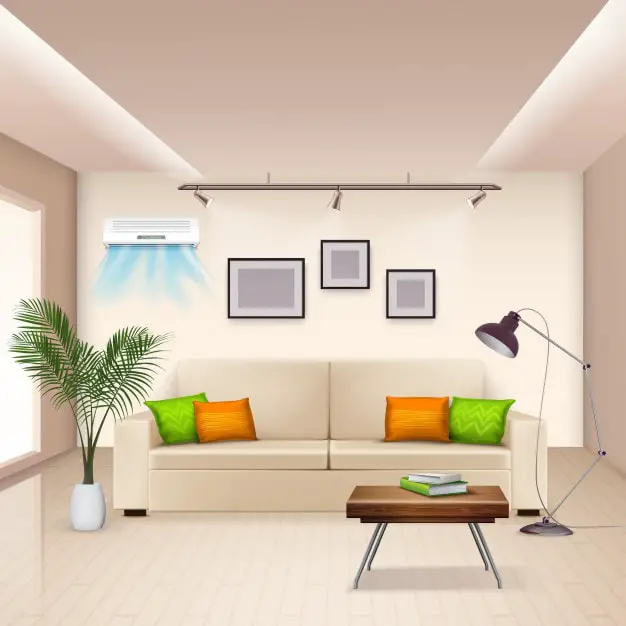
Upfront Unit and Installation Costs Above Budget
The unit costs might range from a few hundred dollars to thousands for higher-end models. Still, you can find affordable options among the large variety. What makes the initial costs higher is the installation.
Cooling Several Rooms
Choosing a wall AC to cool several rooms isn’t a great solution if you aren’t buying a multi-split unit. It might get chilly in the space it’s mounted in, while other parts of your home or office will stay hot and mess up the unit’s efficiency.
Open plans are the best in terms of heating and cooling. If you have a fixed unit in a space fragmented with walls or cubicles, a wall-mounted unit will be inefficient.
Total Costs Above Budget
A single wall-mounted unit in one room is much less costly in the long run compared to a portable unit in the same room. However, if you have many spaces to cool down, the costs can climb up fast.
Everything depends on the method: are you installing more units for other spaces, or are you chilling one room for the sake of the other (neither are great options)?
If You Desire a Maintenance-Free Unit
You can’t install a unit and let it sit there for years without touching it. You have to clean or change the filter regularly. Luckily, some high-end models have an “automatic cleanup” mode. Once activated, it pushes dust particles out of the appliance.
How Do Wall-Mounted ACs Compare?
We’ve touched upon comparing the different AC technologies and the pros and cons of wall units. However, let’s go over some aspects again in the context of specific types.
Wall-Mounted vs Portable Air Conditioner
Both units have the final goal of cooling the rooms they’re in. However, there are a few considerable differences.
Portability
This is a glaring one. While mounting the AC on the wall is a permanent solution for the specific room, you can move the portable unit and set it up in different areas for more temperature control.
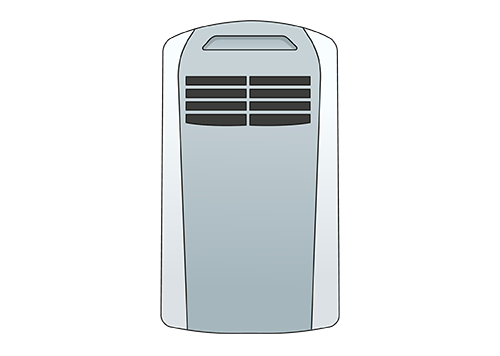
Still, moving a unit can be a hassle, especially if you have one of those lower-quality window seals that don’t require couplers.
Electricity Bill
Wall units are more expensive, but they save you money in the long run compared to the portable ones, which eat up more electricity to the same effect.
Installation
For wall-mounted units, the installation price adds to the initial costs. Portable ACs are more affordable, and you don’t have to call a crew to install them. Just make the connections, insert the exhaust hose, and you’re done!
Wall-Mounted vs Window Air Conditioner
As these two types of units are relatively static, they can only cool one room at a time. These units usually have similar functionality like heating and cooling, dehumidification, and fan-only modes.
As to the differences, there are a few notable ones.
Permanence
Although you can leave a window unit during winter, it usually takes up precious space. If the unit offers heating and cooling modes, it’s likely to stay there all the time.
Wall units are more permanent. They need professional installation and, for rented apartments, landlord permission. In this case, window units might be a better solution for those who intend to move.
Design
If you’re a design-oriented person, the window units might not seem like a great option. They’re usually bulky and block the window. Wall-mounted ACs are easier to blend into the room design.
Initial Costs
Mini-split units cost more because of the added installation charges. You can set up the window unit yourself and save money.
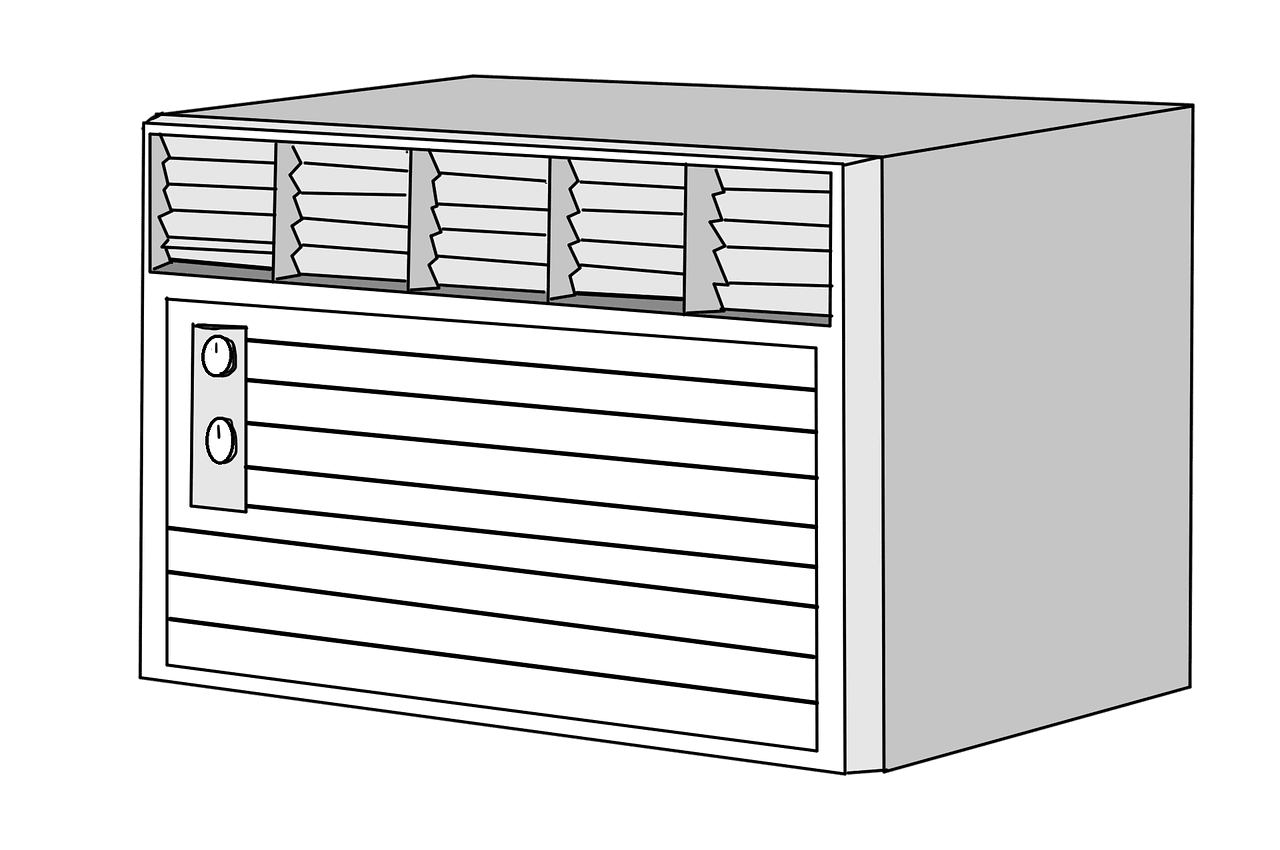
Conclusion
As you can see, owning a wall-mounted AC is an absolute must for hot summers. If you consider all your needs and factors before buying one, these units are among the most efficient and lasting choices.
People Also Ask
The section below covers some additional questions regarding wall-mounted units and how they work.
Wall-mounted ACs consist of two units: indoors and outdoors. The former draws the air from the room into the appliance. It goes through the cooling condenser that contains the refrigerant and comes back into the room.
During the cooling process, the AC also pushes the moisture out. The dehumidified and lower-temperature air returns to the room. While working, the unit generates heat. This heat exhaust and the moisture get pushed outside through the external unit.
Most wall-mounted ACs are more powerful than their window or portable counterparts. At the same time, they’re more expensive and take professional installation.
There are a few considerations before choosing between a portable, window-mounted, or wall-mounted unit, including price, capacity, square footage, BTUs, and energy efficiency.
All ACs need venting to remove the hot air and moisture generated during operation. However, the wall-mounted appliances use another system for pushing hot air and moisture out. The setup is already attached to the unit during installation.
You don’t need to obtain a separate hose to vent it as you do with portable units.
Your wall-mounted AC’s efficiency depends on many factors like the age of your ducting and if there are leakage points around the doors and windows. Still, as a rule of thumb, wall units are more efficient than window or portable ones.
Wall-mounted ACs should be attached to a wall at higher levels. The optimal location for an AC should be a place that allows good airflow to and from the unit. You should ensure even cooling for the whole space.
No. Split units can sit on the wall separately from the outdoor unit. Indoor and outdoor parts of a through-the-wall AC are one and can’t be separated. They also use a wall sleeve for support.
Unlike split, wall-mounted ACs, these can only be installed on exterior walls so that the condenser unit is outside the building.
Yes. Most modern, sleek wall-mounted units can heat and cool, depending on the set mode. This eliminates the need for a separate heater if you don’t have a central system.
